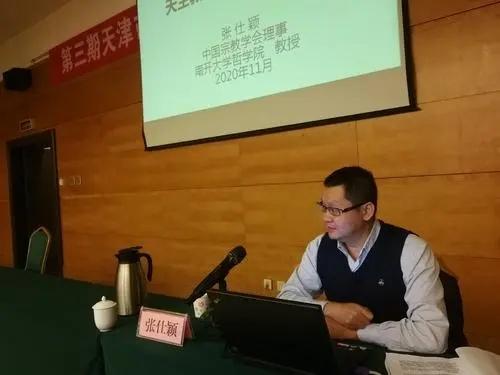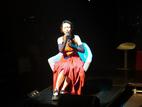In a serial lecture campaign regarding Marth Luther, a professor delivered a lecture on explaining the modernity of Protestantism from the thoughts of Jean-Jacques Rousseau and Martin Luther.
On December 13th, 2021, Professor Zhang Shiying from the School of Philosophy of Nankai University delivered a lecture titled “Luther and Rousseau - An Introduction to the Modernity of Protestantism” in the second season of the "Martin Luther and the Third Enlightenment Forum".
The lecture consists of four parts: the origin; the basis of common thoughts; themes of enlightenment; and crises of modernity and enlightenment.
The Origin
In his work on the history of thoughts Three Reforms, Jacques Maritain puts forward that “Luther discovered personality and Descartes discovered thoughts, while Rousseau discovered nature and freedom.” Surprisingly, Maritain thinks that Rousseau was not directly influenced by Calvin and his theology, or under the influence of Catholicism which seemed superficial. Instead, he inherited Luther’s Protestant spirit.
Defined by Leo Strauss as the initiator of second-wave modernity and an enlightenment thinker, Rousseau’s influence on Chinese society was estimated to be second only to Carl Marx. His theory of civil rights was regarded as the standard by Huang Zunxian, the ideological pioneer of China’s civil rights revolution. Luther’s influence on China was much smaller, almost entirely limited to Christianity and Lutheranism.
The basis of common thoughts
Luther and Rousseau were both Protestants. Luther was a theologian, a pastor, and a leader of the Reformation while Rousseau was a deist, a follower of gospel teachings, and a non-priest. The difference between them was similar to that of Paul and Jacob.
Meanwhile, neither of them was accepted by their times and were persecuted by their churches. They all saved their religion in their respective times. With the rise of Christian humanism and the failure of church reform, Luther saved Christianity by purifying its beliefs during that era by means of reformation. Under the background of atheism being the fashion in the ideological circle at that time, Rousseau, seeing the role of Christianity in maintaining morality, put forward his political philosophy proposition that civil religion was the social and political foundation.
Themes of enlightenment
1) Ego
Luther was the pioneer of the “spiritual self” in the sense of modernity. Because of faith, the ‘self’ emerged from the medieval “great chain of being” as described by Thomas Aquinas, in which all intermediaries were eliminated, and the direct relationship between man and God was proposed. The faith of the church, fellowship, and other believers could strengthen one’s faith, but it could not replace one’s faith.
Rousseau’s ‘self’ was “to be your true self”. Rousseau’s metaphysical dualism based on soul and body set the natural self of human beings. In a natural state, we had two natural emotions: self-love and pity. A natural ability and emotion, conscience produced by socialization was derived from the combination of two kinds of emotions: one is the natural emotion (such as pity) that connected oneself with others, and the other was the self-centered natural emotion (self-love). Rousseau believed that the essence of human beings lied in conscience, which was the fundamental difference between human beings and animals. While recognizing conscience as the fundamental self of human beings, Rousseau’s optimistic theory of human nature also made him think that perfectibility was the fundamental feature of human beings.
2) Freedom
Rousseau said, “People are born free, but they are everywhere in chains.” For Luther, freedom first meant getting rid of sin, being justified by faith, being redeemed by the fire of the Holy Spirit, and being reconciled with God. Because of God’s special grace and the truth in God’s way, Christians gained freedom and conquered sin, death, and hell. Luther expressed the freedom of Christians in a contradictory way: “A Christian is a perfectly free lord of all, subject to none. A Christian is a perfectly dutiful servant of all, subject to all.” The former was about freedom in faith while the latter referred to freedom in love. Through the freedom of faith, Luther claimed that “every believer is priesthood”, which realized that everyone is equal before God.
Of course, Rousseau not only regarded freedom as a natural human right but also talked about freedom of belief, moral freedom, and social freedom. The idea of the freedom of belief completely inherited the freedom principle from Protestantism.
3) Rationality (nature)
Luther’s rationality (nature): He divided the rationality in the relationship between man and God and the rationality in the secular kingdom, which is given to man as a gift when he is created, the rationality in sinners after the fall, and the rationality in the life of newborn Christians.
Rousseau’s rationality (Nature): “Rationality alone cannot play a role. Sometimes it can restrain a person, but it rarely encourages people. Nor can it cultivate any great mind. If those humble minds keep reasoning, they will surely be made crazy.” As an emotionalist philosopher, Rousseau saw the limitation of reason in the field of moral obligation. Reason makes people know good and evil but cannot make people love and do good.
4) Human nature
Luther believed that human nature and human beings would move towards progress and civilization through enlightenment and education, and human society would enter the ideal realm of harmony between rationality and nature.
From the brilliance of human nature in Luther’s life, we ciykd find that, based on the Christian standpoint. He also affirmed the perfectibility of human nature, that is, righteousness and sanctification, and even righteousness in the sense of soul salvation.
Rousseau established the doctrine of goodness in nature that is the original conditions and conditions of pre-culture and pre-rational system of human life must be good, innocent, and happy, but a kind of good mentality, an inherent premise of innocence and happiness, which must belong to human nature itself.
5) Religious understanding
As a Christian theologian, Luther talked about Judaism, Islam, and other pagans, and advocated that pagans or heresies should be treated by the way of God instead of force, which reflects the enlightenment spirit of religious tolerance.
Rousseau advocated natural religion and gains a profound idea of God through natural scenes and inner voices. If human beings only listened to what God said in their hearts, there was only one universal rational religion in the world. Worship required by God is sincere worship in the heart as what God wants is true admiration from people in spirit. This is the bounden duty of all religions, countries, and nations. Christianity was the established religion that most accords with natural religion, and it was the most reasonable and holy religion. Rousseau only believed in the Bible and reason as the only principle. The truest religion should be the most social and human religion, that is, civil religion.
Rousseau’s confession and his views on marriage and family all reflected the weakness of the people-centered theory. Being a virtuous person, that is, a person with personality, dignity, and the image of God, pursuing eternal truth, freedom and infinity was more desirable than the prosperity of the world, which may might the best enlightenment of Luther and Rousseau’s thoughts to the world today.
- Translated by Charlie Li








